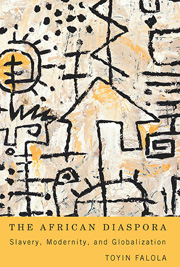Book contents
- Frontmatter
- Dedication
- Contents
- Preface and Acknowledgments
- Introduction: The Old and New African Diaspora
- Part 1 The Old Diaspora: Slavery and Identity Politics
- 1 Africa and Slavery in a Transnational Context
- 2 The Slave Mutiny of 1839: The Colonization of Memory and Spaces
- 3 The Centralization of Africa and the Intellectualization of Blackness
- 4 Communalism, Africanism, and Pan-Africanism
- Part 2 An African Case Study: Yoruba Ethnicity in the Diaspora
- Part 3 The New Diaspora: Transnationalism and Globalization
- Postscript: United States Foreign Policy on Africa in the Twenty-First Century
- Notes
- Bibliography
- Index
4 - Communalism, Africanism, and Pan-Africanism
from Part 1 - The Old Diaspora: Slavery and Identity Politics
Published online by Cambridge University Press: 05 September 2013
- Frontmatter
- Dedication
- Contents
- Preface and Acknowledgments
- Introduction: The Old and New African Diaspora
- Part 1 The Old Diaspora: Slavery and Identity Politics
- 1 Africa and Slavery in a Transnational Context
- 2 The Slave Mutiny of 1839: The Colonization of Memory and Spaces
- 3 The Centralization of Africa and the Intellectualization of Blackness
- 4 Communalism, Africanism, and Pan-Africanism
- Part 2 An African Case Study: Yoruba Ethnicity in the Diaspora
- Part 3 The New Diaspora: Transnationalism and Globalization
- Postscript: United States Foreign Policy on Africa in the Twenty-First Century
- Notes
- Bibliography
- Index
Summary
Two sets of ideas serve as the preface to this chapter. The first revolves around a cluster of negative images about the continent of Africa in the Western media and various publications that focus excessively on wars, conflicts, coups, political instability, and their consequences. Since the fifteenth century, the characterization of Africa as a so-called dark continent was meant to separate this so-called black Africa from North Africa, later to separate it from South Africa and then the rest of the world. You must have heard one or all of the following in the list of negative images generated by Afro-pessimists and Afro-cynicists: Africa's people had no history; they had no values beyond sex and gluttony; and they had no claim to justice, valuable land, religion, governance, or the ideas of state formation. Whether you add to or subtract from this list, there is a consensus around the reasons for these images: the need to exploit Africans (but at the same time to insult them); the need to enslave its people, basing the forced migrations of over thirteen million people on nonmarket rationality; the need to conquer them (and also to divide them in the process); and the need to prevent a unity that could generate anticolonial nationalism.
- Type
- Chapter
- Information
- The African DiasporaSlavery, Modernity, and Globalization, pp. 91 - 116Publisher: Boydell & BrewerPrint publication year: 2013



